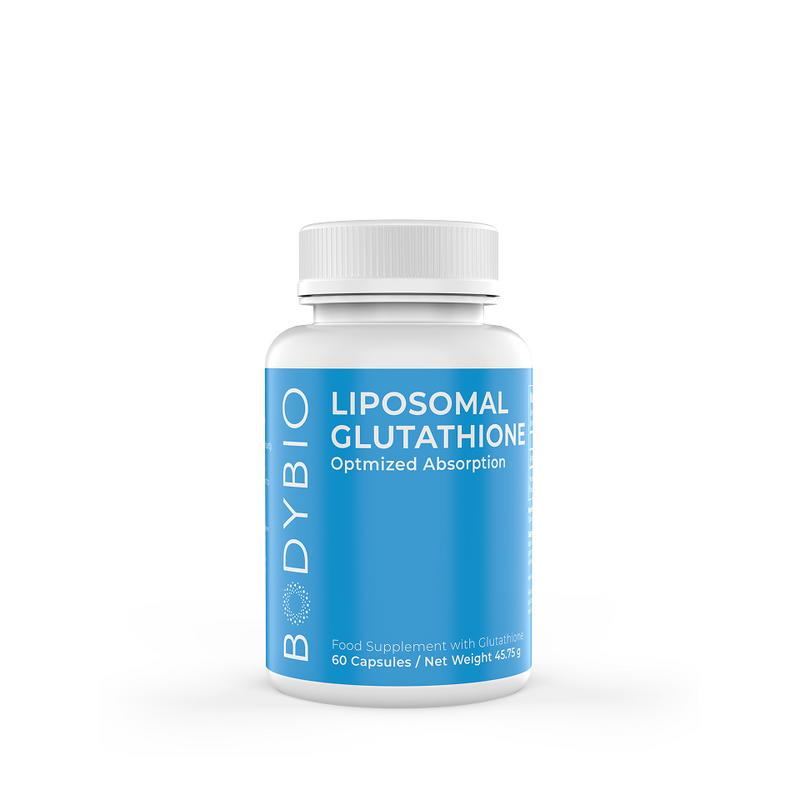How Liposomal Glutathione Supports Detoxification, Immunity, Brain Health and More*
There are many nutrients your body needs to function at its best, including vitamins, minerals, proteins, and many more. Some of these nutrients serve a very specific purpose, and we only need a little each day to meet our needs. But others are widespread and have multiple roles in the body, so they are worth prioritizing when thinking about your diet and supplement routine. Glutathione is one of these (perhaps underappreciated) multifunctional nutrients.
In this article, we’ll explore:
- What is liposomal glutathione?
- What’s the difference between liposomal glutathione and reduced glutathione?
- Benefits and uses of liposomal glutathione
- Liposomal glutathione side effects
- Symptoms of glutathione deficiency
- Glutathione sources
- BodyBio Liposomal Glutathione.
What is Liposomal Glutathione?
Glutathione is known as the master antioxidant in the human body. We need glutathione to power our detoxification pathways, support the immune system, produce energy, facilitate gene expression, and empower cellular communication, among other responsibilities. So to say glutathione is an important molecule for human health would be a bit of an understatement. It’s so important, in fact, that its levels in the cell are comparable to glucose, potassium, and cholesterol, all of which we need in abundance for good cellular function [1].
As the master antioxidant, glutathione protects us against many toxic compounds and pollutants that we encounter in everyday life today, including:
- Free radicals
- Mercury and other toxic metals
- Alcohol
- Organic pollutants/pesticides.
In the body, glutathione is produced by liver cells, and is composed of the amino acids cysteine, glutamic acid, and glycine (all the more reason to make sure you’re getting enough protein!). But even though it’s made in the liver, glutathione can be found in every cell of your body as well as some extracellular areas, like the lining of the lung [2].
Liposomal glutathione is glutathione in liposomal form, which means it’s been broken down and encapsulated in microscopic liposomes (tiny globules surrounded by a lipid bilayer similar to your cell membranes). This encapsulation allows the glutathione to be more efficiently absorbed and transported directly into your cells, where it can do the most good.
What’s the Difference Between Liposomal Glutathione and Reduced Glutathione?
Reduced glutathione, or L-glutathione, is simply the active form of the molecule, the form that allows it to perform its many roles in detoxification, immunity, and so on [1].
Many glutathione supplements are formulated in this active form so that your body does not have to change it in any way to begin using it. However, just because you are taking the active form of glutathione does not necessarily mean that it’s getting into your cells. Most glutathione supplements are simply broken down in the stomach, and only a fraction of the supplement makes it into the bloodstream.
Liposomal glutathione, on the other hand, is protected from the harsh environment of the stomach by the liposomes and is able to pass through cell membranes to be used directly within the cell [3].*
Benefits and Uses of Liposomal Glutathione
There are almost too many benefits and uses of liposomal glutathione to name, but let’s take a look at some of the big ones.
Supports Detoxification Pathways*
The liver is responsible for detoxifying the body, cleaning out toxins, pollutants, and cellular waste and sending it on its way out of the body via the digestive system. This process has two phases. The first phase includes initial processing of toxins like smoke, alcohol, pesticides, drugs, etc. using specialized proteins.
Unfortunately, this initial processing creates toxic byproducts called free radicals. Dealing with free radicals is one of glutathione’s many jobs, and with all of the toxic exposure we have these days, it’s easy to use up your glutathione stores rather quickly.
Then, in phase two of detoxification, glutathione is required again as a chaperone to attach to various toxic substances and render them inactive, also making them water-soluble and more easily transported out of the body. So, if we’re lacking in glutathione before we even get to phase two, that’s going to result in some problems.
We need glutathione to move these toxic substances through the detoxification process and into elimination pathways via the kidneys, liver (bile), and intestines [4]. If we don’t have enough, toxins can begin to build up and cause dysfunction and damage to your cells. Supplementing liposomal glutathione can help you replenish your glutathione stores and support detoxification.*
Supports Mitochondrial Function*
Another key operation glutathione supports is mitochondrial function [5]. Mitochondria are the powerhouses of the cell, producing ATP. You feel your mitochondria working as a sense of energy and vitality. When your mitochondria aren’t functioning well, they produce less energy for your cells, and you feel lethargic and fatigued.
Within the cell, mitochondria can be damaged by free radicals and toxins. As we mentioned already, glutathione binds to these harmful substances and inactivates them, protecting your means of producing energy.
Many chronic illnesses are characterized by intense physical fatigue and low energy. By protecting mitochondria and allowing them to create ATP, liposomal glutathione may support healthy energy levels.*
Promotes Healthy Aging*
One of the many side effects of aging is that we naturally produce less glutathione. So, we become more easily susceptible to illnesses, our energy levels decrease, we experience more forgetfulness and neurological degeneration, and some cellular processes begin to break down.
Supplementing liposomal glutathione may support energy levels, immunity, and neurological function in older adults [6, 7].*
Supports Brain Health*
In a sense, glutathione’s ability to support brain health is almost a side effect of reinforcing the body’s detoxification pathways and cellular energy production. Naturally, when your body is able to clean out the metabolic trash and help you feel more energized, your brain functions better.
Glutathione also protects the brain against toxic damage and oxidative stress, factors which may contribute to neurodegenerative diseases [8]. For example, scientists have connected Alzheimer’s disease to decreased levels of glutathione in the brain [9, 10].
Liposomes are able to pass through the blood-brain barrier to carry their contents directly into neurons. In this way, liposomal glutathione may support brain health better than a non-liposomal supplement.*
Supports Immunity*
One of glutathione’s most powerful roles is to support the immune system. It does so by facilitating the detoxification and energy production pathways outlined above, but research shows that it also can have an effect on certain immune markers directly.
A recent study showed that supplementing oral liposomal glutathione altered the immune response to Mycobacterium tuberculosis and Mycobacterium bovis in individuals with type 2 diabetes. Over a period of three months, liposomal glutathione supplementation supported the reduction of oxidative stress and mycobacterial burden in patients, as well as supported the modulation of inflammatory cytokines [11].*
Another study demonstrated that immune function markers were enhanced, including NK cell cytotoxicity and lymphocyte proliferation, after liposomal glutathione was administered to study participants for just two weeks [12].
Liposomal Glutathione Side Effects
Because of its formulation, you are less likely to experience side effects with a true liposomal glutathione. However, everyone responds to new therapies differently, and glutathione is a strong antioxidant. If you are sensitive to supplements, or you have complex health issues going on, you might experience a die-off or Herxheimer reaction when using liposomal glutathione.
As with any new therapy, work with your healthcare provider to determine the right dose and schedule for you. If you notice fatigue, flu-like symptoms, or any other worsening of symptoms after you begin using liposomal glutathione, you can lower your dose or back off completely until the symptoms subside.
Symptoms of Glutathione Deficiency
Not only can you be deficient in glutathione, it’s probably more common than we think in modern life (and yet not commonly measured in standard lab tests). With high chronic stress levels, increased toxin exposure, and low nutrient content even in many whole foods, it's easy to use up your glutathione supply rather quickly.
Signs that you may have low glutathione include:
- Sluggishness, fatigue
- Brain fog
- Poor memory
- Lowered immune function
- Digestive issues [13]
- Joint pain/muscle stiffness
- Skin problems.
Liposomal glutathione may help restore your glutathione levels and maintain immune health, digestive function, brain health, and more.*
Sources of Glutathione
It is possible to support glutathione levels in the body through your diet. Since glutathione is made from the amino acids cysteine, glycine, and glutamic acid, you can consume foods with those amino acids to boost glutathione production.
Other nutrients, such as B vitamins, vitamin C, vitamin E, selenium, and omega-3 fatty acids have also been shown to support glutathione levels, so eating foods that are high in these nutrients may also be helpful [14]. Some examples include:
- Cruciferous vegetables, asparagus, broccoli, cauliflower, brussels sprouts, etc.
- Spinach
- Strawberries
- Citrus fruits
- Salmon
- Liver and organ meats
- Shellfish, such as oysters
- Green tea
- Herbs, such as rosemary, milk thistle, and turmeric.
You can also boost glutathione in the body by supplementing its precursors, N-acetyl cysteine and glycine [15]. However, compared to pre-formed liposomal glutathione, this is another step for the body to complete to make its own glutathione. If you are looking for a more rapid boost in glutathione levels, supplementing with liposomal glutathione may be a better option.
The Potential Health Benefits of Liposomal Glutathione*
Glutathione is one of the most abundant intracellular molecules in the body. It performs many roles, but primarily it acts as your most powerful antioxidant, combating free radicals and oxidative stress that can slow and eventually break down cellular function.
The power and therapeutic potential of glutathione is what led us to develop BodyBio Liposomal Glutathione, using proprietary liposomal encapsulation technology that allows for maximum absorption on a cellular level.
Whether you are looking for detoxification or immune support, brain health, or longevity benefits, BodyBio Liposomal Glutathione is a high-quality, science-backed supplement for supporting cellular health.






